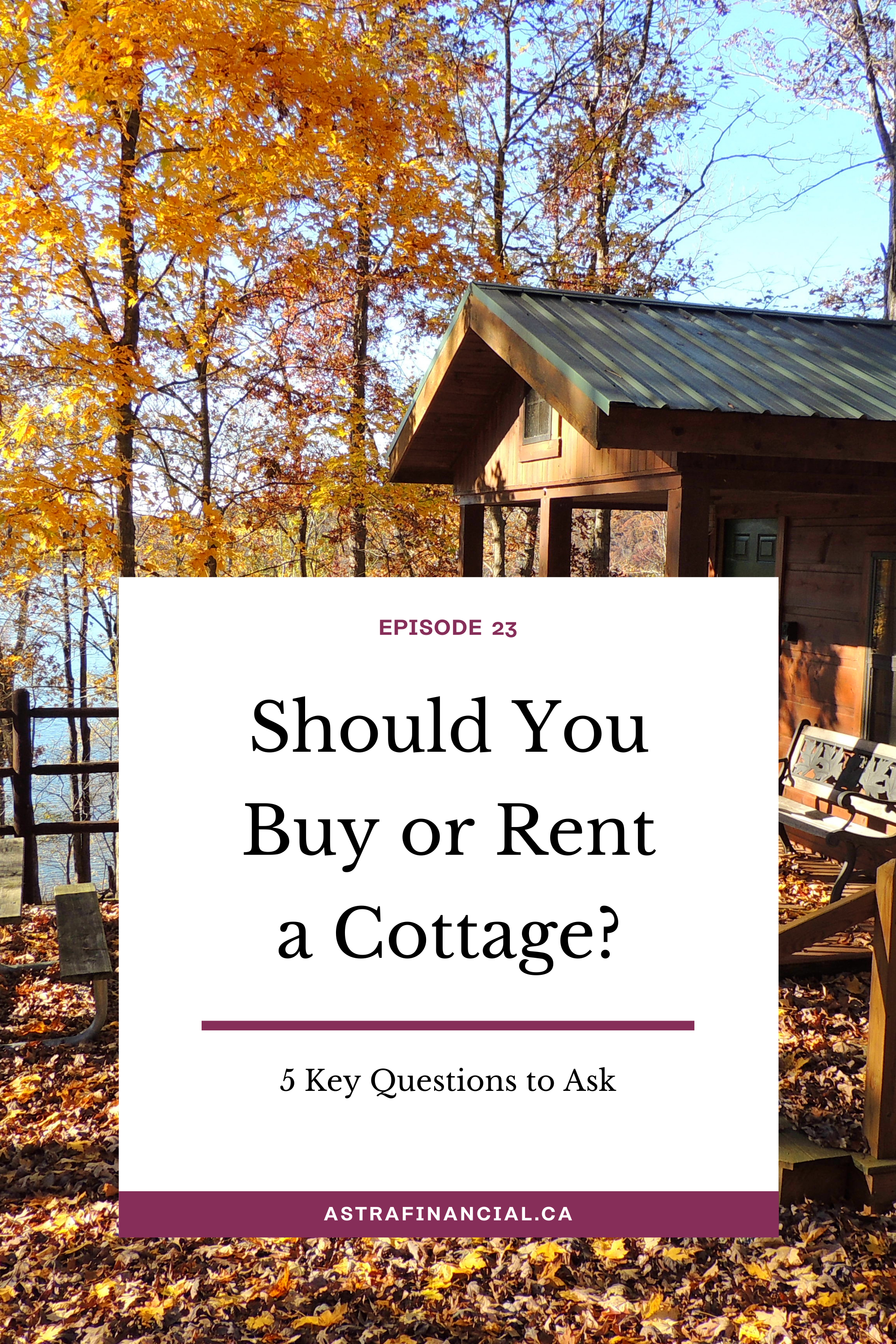Episode 23 – Should You Buy or Rent a Cottage?
Cottage life is one of those things that lots of us dream about and want to make happen. Whether it’s buying a place of our own or renting something for a few weeks at a time, being on the water and away from the hustle of everyday life to make new memories with our families is priceless.
That being said, a lot of thought needs to go into whether you should buy or rent a cottage, which is why I put together a podcast with 5 questions that you should ask yourself if you’re considering it.
The best decisions are informed decisions and I want to help you make one, so take a listen now and start planning your ideal cottage life.
Show Notes:
Hello, and welcome back to another round of, “Our Heart of Money Talks”. This is episode 23. Let’s talk cottages. Should you rent or buy one? COVID has brought a record amount of people looking for ways to get away and spend time at the lake or the beach. I’m in Saskatchewan cabin sales, we’ve set a record.
We’ve had a couple of clients sell their cabins, and I think they’re flying off the shelves right now. Cottages are a financial commitment wrapped up in a whole lot of emotion. We have visions of our children being there, the memories cabin life creates and the bonding time as a family. We might even think of the legacy factor and wanting to pass a property down to our children one day.
But in that emotional decision is a possible, super expensive purchase. So should we be rushing out to buy a cottage or maybe we should just rent one every year? What are the pros and cons?
So I’ll go through a few things today.
I do have five questions that you can use to ask yourself, to start prepping and planning and see if this is something that’s right for you.
From a financial perspective, I think it’s not always a great idea to buy a second property that you’re not going to rent out or live in. It can be incredibly expensive to upkeep and all the same bills that come with owning a house, like property tax utilities, insurance cottages, have them all. A lot of cottages also need annual maintenance.
You’re also tied to just that one location. So you really got to think about that. Tax scenarios are a bit complicated and require a lot of planning. A second property has us paying capital gains when we go to sell it. So if you own a home and cottage, and at one point you’re selling one of those properties, you have to choose your principal residency.
Also, let’s face it at some point in time, the taxman is going to come and get his pound of flesh. So there’s going to be, what’s called capital gains tax on one of those properties when you go to sell it. What are capital gains? Let’s just say you bought a cabin for $100,000, then some time passes and you sell it for $200,000.
That means you have a $100,000 capital gain. Capital gains are taxed at 50% on your personal tax rate. So you’re going to pay a big chunk of change to the taxman for that one. Taxes should be something in the back of your brain all the time and considering the scenarios of how to plan that, so nothing comes as a surprise, especially if you can choose, do you want to use your house as principal residency, or do you want to use the cottage.
It’s all going to come down to how much you bought one of those for and how much the gain or growth has been.
Another thought is the taxes around planning your estate and your legacy and how you want that cabin to pass on.
Do you want to pass it onto the family? What are the wishes? And then also there’s going to be a tax if you have to sell it, or if your estate has to sell it after you’ve passed away. Things can be a little bit complicated depending on all of those scenarios.
But, of course, there are positive, good things.
The pros. The memories and the lifestyle, and everything that you’re creating as a family and the bonding. I also think about long-term ownership, think over 20 years or more, if you’ve maintained that property, most likely it’s going to see some increase in property value and maintain that amount.
That in itself is a bonus.
I’m going to ask you these questions. These are five important questions, and I think if you’re on the fence and you’re considering buying a cottage I really think you need to go through these.
So question number one. How much will it really cost you?
Do some homework here and actually be realistic. Can you afford two mortgages? Do you know the bills that the cottage is going to create?. Think of the utilities and the property tax. Do you have a budget for the list of potential repairs or extra purchases that you’re going to need?
What about the boat dock or launch repair? The boat motor? The whole point of having this cottage was to enjoy some of those things. So you want to be able to afford those repairs and purchases.
The second question is how much will you really use it? This is something that factored into my own brain is really how much were we going to be able to go out there?
Is it close to home? Do you get summers off?
I do know a couple of teachers with fantastic cabins. They live out at the cabin all summer with the family. Do you have that time off? How much time can you realistically expect to spend there?
Number three. Are you going to rent it out?
Being able to rent it out when you’re not there might help with the cost. So that might be something to think about. How easy would it be? Is there a demand or a need? Are you willing to set up Airbnb, put the word out there and make an extra few bucks? So that’s something to think about.
Number four. Have you diversified before you lock up all your money in a house and the second property? What I mean here is, are you still having enough cash flow to invest for retirement? You don’t want to put all your eggs in one basket and that being real estate. So you want to make sure that you still have enough cash flow with the purchase of the cottage that you can still save for retirement. You still need to have that cash emergency savings bucket that when the time comes that you’re going to need a new vehicle down the road, you aren’t wondering how are you going to pay for it.
You still have to take care of your future self and have some other investments and savings.
Question five. What financing is available and is it a low-interest rate? You really have to do some homework here and dig at the bank, because there are some rules with financing cottages. It is not as easy to get a mortgage,
They’re going to ask questions like, “Is there running water? Is there installation?”
They’re going to go through all those things. Depending on the type of cottage that you buy, this might become a problem. You might not qualify for a traditional mortgage or they might have an increased interest rate.
So those are your top five questions to start before you start tackling this.
This is a completely personal opinion, but I can’t imagine having to run another household. Our personal finances are like running a business.
I say that all the time to people, I say, it’s like we run two businesses, we run our homes and then we run our careers. If you’re a business owner, you actually are literally running another business and we have to make plans. We have to make sure the bills are paid on time.
With a cottage, we have to keep up with all the repairs and the work. I already run an actual business and I run my home. I don’t want to add a third. It sounds more stressful than peaceful for me. That was really my clue. If it feels more stressful and it’s not bringing that sense of peace and leisure that it’s meant to, then that’s a flag.
What I do love doing is renting a place, furnished with boats, a hot tub, all of the fun stuff. We’ve gone to Tofino and we’ll rent a place for two weeks. I don’t have to worry about cleaning it up after I just get to walk away. In fact, they even ask us to leave the towels in the bathtub. I love it.
Personally, I do not have enough room in my brain for owning a cottage.
This is really up for discussion with couples because I have seen situations where one couple is adamant, wants a cottage. They’re going to make it work and the other partner is very hesitant and has that kind of the same feeling that I have. I don’t want to start doing yard work when we get there. So this is about communication for your own personal preference as well.
Now, if any of those five questions that I asked sparked some stress when you were answering them, you need to think about as my 21-year-old says.
“Check yourself before you wreck yourself.”
You need to think about that. Maybe renting might be the better bet for you. So this takes a lot of planning and you’ll want an expert to review it and come up with some of the scenarios. Review the finances and make sure that it’s all sound and you’re not putting yourself at risk.
If you have any questions, please send me a note at [email protected]. That’s it. That’s all for today. Take care and we’ll talk next week.





